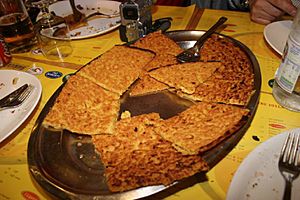Farinata facts for kids
 |
|
| Alternative names | Socca, cecina |
|---|---|
| Type | Pancake |
| Place of origin | Italy |
| Region or state | Liguria, Tuscany |
| Main ingredients | Chickpea flour, water, olive oil |
Farinata is a tasty, thin pancake or crêpe. It is made from chickpea flour. This special dish started in Genoa, Italy. It then became popular all along the Ligurian Sea coast. You can find it from Nice in France to the islands of Sardinia and Elba. In Gibraltar, it is called calentita.
Contents
The Story Behind Farinata
No one knows exactly how farinata began. One old story says it was invented by Roman soldiers. They supposedly cooked chickpea flour on their shields! This happened a very long time ago.
Different Names for Farinata
This yummy dish has many names, depending on where you are!
- In standard Italian, it's called farinata, which means "made of flour."
- In the Genoese dialect, it's known as fainâ.
- In Massa, Italy, people call it "calda calda," meaning "hot hot."
- In Nice, France, and the Côte d'Azur, it's called socca.
- In Tuscany, Italy, you might hear cecina ("made of chickpeas") or torta di ceci ("chickpea pie").
- In Sardinia, it's called fainè.
- Far away in Uruguay and Argentina, it's super popular and known as fainá.
How Farinata is Made
Making farinata is quite simple! First, chickpea flour is mixed with water and olive oil. This creates a runny batter. Then, this batter is poured into a pan. It usually makes a pancake about 4mm thick. It is traditionally baked in a very hot, open oven. Special tin-plated copper pans are often used. You can add fresh rosemary, pepper, and sea salt for extra flavor. Farinata is usually cut into triangle shapes. It's often eaten plain, with just a sprinkle of black pepper. In places like Pisa or Livorno in Tuscany, it's sometimes served inside small focaccia bread or between two slices of bread. You can often buy it in pizzerias and bakeries.
Italian Farinata Styles
Along the Tuscan coast, south of Liguria, farinata has different names and slight changes. In the province of Pisa, Livorno, and Lucca, it's called cecina. In Massa Carrara, it's known as "calda calda." In Livorno, it's often called torta (di ceci). These versions usually don't use rosemary. In Sassari, Sardinia, because of old connections with Genoa, a dish called fainé genovese (Genoese fainé) is very common. In the Savona area, near Genoa, there's a version called farinata bianca . This "white farinata" is made with wheat flour instead of chickpea flour. In Genoa, some farinata recipes include onions or artichokes. A famous special version is fainâ co i gianchetti, which is farinata with tiny fish called whitebait.
French Farinata Styles
- Socca is a popular dish in southeastern France. It's especially famous in and around Nice. Socca is very similar to farinata. Some people say its texture is a little different. It might be baked on large copper plates, over a meter wide!
- Near Toulon and Marseille, you might find a similar dish called cade.
- Panisse is a specialty from Marseille. It's like farinata but thicker. Panisse is usually cut into rectangles and then fried.
Farinata Around the World
Farinata-like dishes are enjoyed in many other countries too!
- In Algeria, a similar dish called karantita is very popular. It's served hot with cumin and harissa spice.
- In Argentina and Uruguay, many people from Liguria moved there long ago. Because of this, farinata is known as fainá, like the original Genoese name fainâ. It's often eaten on top of pizza, which is called a caballo (meaning "on horseback").
- In Uruguay, "el fainá" is a traditional dish. August 27th is even called "Fainá Day" there! Sometimes, other vegetable oils are used instead of olive oil, which can change the taste a bit.
- In Gibraltar, many people have Genoese roots. Here, it's known as calentita when baked. When it's fried, it's called panissa. These are usually eaten plain. They are even considered Gibraltar's national dishes!
- In India, a similar dish is called "chila" or "puda." It's made by cooking chickpea flour and water on a hot, oiled pan. Sometimes, vegetables like onions, green chillies, and herbs like coriander are added.
Images for kids
See also
 In Spanish: Fainá para niños
In Spanish: Fainá para niños
 | Jewel Prestage |
 | Ella Baker |
 | Fannie Lou Hamer |




